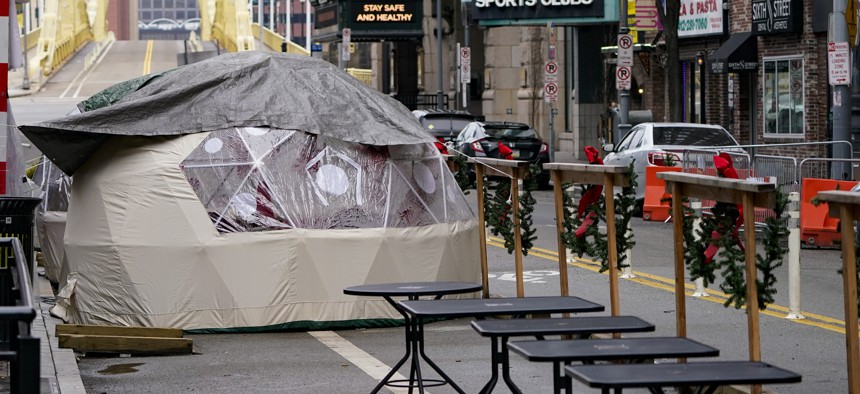Covid Caused Cities to Rework Rules for Restaurants. Which Changes Will Stick?

Kiosks for outdoor dining are situated in front of restaurants along Sixth St. in downtown Pittsburgh, Sunday, Jan. 17, 2021. AP Photo/Keith Srakocic
Over the past year, cities have taken action that’s ranged from streamlining permits for outdoor dining, to providing benches for restaurants to use for seating.
Cities took a number of steps to allow restaurants greater flexibility during the coronavirus pandemic, doing everything from blocking off streets for dining, to allowing the sale of alcoholic drinks to go.
While business experts expect some of the innovative projects will no longer be needed once the pandemic subsides, others may change the way cities think about regulating businesses or public space in the future.
Restaurants were hit particularly hard during the pandemic. Upwards of 110,000 restaurants closed last year and sales were $240 billion lower than projected, according to the National Restaurant Association.
Mayors have “a huge opportunity” to get involved in helping restaurants weather the next few difficult months as Covid-19 vaccines are distributed, said Mike Whatley, the association’s vice president of state and local affairs, during a panel discussion hosted last week by the U.S. Conference of Mayors.
Options could range from offering grants to help restaurants winterize outdoor patios while indoor dining capacity is reduced, to easing parking restrictions in business districts to help accommodate the surge of third-party delivery drivers, Whatley said.
In Burnsville, Minnesota, the city reimbursed bars for their liquor license fees during times that they were required to close to the public, said Mayor Elizabeth Kautz, during the Conference of Mayors panel. The city also repurposed tables from city parks so that restaurants could use those for outdoor seating rather than spend money to rent or purchase their own.
But even something as simple as a mayor highlighting a restaurant every week on social media can be an effective way to promote local businesses.
“You have a big public platform,” Whatley said. “When you are out in the community and eating at restaurants, tweet about it.”
A bagel shop in Washington, D.C. recently felt a boost in sales after President Biden had members of his Secret Service team stop in to pick up an order—making it the first restaurant the new president visited during his administration.
Sales at the Call Your Mother bagel shop were up 100% the day after the presidential visit, co-owner Andrew Dana told DCist.
“Something like this is just incredible for local business,” Dana said.
One prominent redesign in many cities during the pandemic involved repurposing of curb space, said Camron Bridgford, a technical and strategic advisor for Transportation for America’s 2020 Smart Cities Collaborative. Transportation for America released a report this month analyzing ways that cities adapted their curb management strategies during the pandemic.
On-street parking has typically been a highly coveted commodity in the past, but cities closed streets and repurposed curbside parking into parks, outdoor dining or space for outdoor markets to allow for social distancing.
“Some of the changes we saw will be short term. Hopefully we won’t have to eat outside in 5-degree weather next year,” Bridgford said. “But some will be longer term.”
To embrace change in the long term, the Transportation for America report suggests cities could take steps like streamlining the permitting process for small businesses to set up curbside, or creating short-term loading zones that could be used by food delivery drivers or others to free up curb space elsewhere.
“It’s ultimately about keeping that curb more flexible and being willing to pilot more ideas as demands on the curb change,” Bridgford said.
Andrea Noble is a staff correspondent with Route Fifty.
NEXT STORY: Baltimore is Latest City to Cap Delivery App Fees Paid by Restaurants





